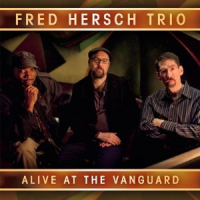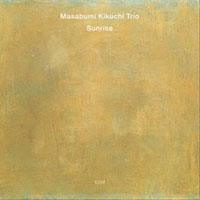Home » Jazz Articles » Multiple Reviews » The Year of the Trio: Fred Hersch and Masabumi Kikuchi
The Year of the Trio: Fred Hersch and Masabumi Kikuchi
 Fred Hersch
Fred HerschAlive at the Vanguard
Palmetto
2012
Despite or maybe because of his recent brush with death, pianist Fred Hersch's Alive at the Vanguard crackles with an intense vitality. Recorded live at the Village Vanguard in New York, the double-CD set covers two separate dates during the trio's tenure in February 2012 at the legendary club. The tracks consist of American songbook standards, bop classics, and Hersch's originals (some of which are dedicated to other jazz masters).
"Tristesse," for example, was written for Paul Motian and opens with a contemplative and mournful piano sonata but as John Hébert's lyrical bass and Eric McPherson's subtle brushes join in, the wistful theme takes on a quiet, celebratory feel, making it the perfect musical eulogy.
The three musicians often engage in ad lib conversations that are edgy, intelligent and completely in synch with one another. The original "Rising, Falling" features dense, fugue like piano lines, atmospheric percussive polyrhythms and a singing bass that together bring forth a single stream of consciousness that shimmers with poetic beauty.
Hersch has an intriguing habit of amalgamating tunes that sometimes appear quite disparate but under his deft fingers flow and melt seamlessly into one another. Hammerstein and Kern's "The Song is You" is fused with Thelonious Monk's "Played Twice." The romantic impressionism of the track is reflected in Hersch's gentle cascade of notes as Hebert's strings sing of heartbreak in the rustle of McPherson's brushes on the trap drum. The piece evolves into a natural angularity as the tempo picks up on the Monk part of the medley. Hersch quotes from other Monk compositions over his band mates' boppish and hypnotic duet.
The unique camaraderie and the high caliber musicianship of the artists makes this double album spanning almost two hours captivating and strangely addictive.
 Masabumi Kikuchi
Masabumi KikuchiSunrise
ECM
2012
Pianist Masabumi Kikuchi's Sunrise is, on the surface, very different than the Alive at the Vanguard. Where the latter is steeped in tradition, full of dense and intricate harmonies, the former is sparse, abstract and forged on the spur of the moment, but with a Zen-like beauty; atonal, sublime and powerful. What makes both records similar in their perfection is the intimate communion among the members of each trio even at its most jagged interaction.
Kikuchi's transcendent concoction of sound and silent pauses brings a lyrical touch to the three "ballads" that open, close and bisect the disc. On the first, "Ballad I" his caresses of the keyboard mixed with Paul Motian's reserved brushes and cymbals and punctuated by Thomas Morgan's dark vibrations conceive a contemplative atmosphere filled with rarefied and elegiac extemporizations.
The second, "Ballad II," although equally economical in musical expression, is more melancholic and mellifluous. Motian brings an uncommon lyricism that is reflected in Morgan's arrhythmic plucked bass strings, while sparkling dark tonalities trickles out of Kikuchi's piano.
The aptly named "Last Ballad" is an exercise in improvised doggerel with lilting group interplay. What makes the disc more poignant is that it was released after Motian's passing and is in a way a homage to his distinguished legacy and his superior skills. The cadence of his drums drives the title track, that starts as an evolving duet between Kikuchi and Morgan until all three instruments coalesce into one intellectually complex and emotionally satisfying spontaneous creation.
On "So What Variations," Motian's simultaneously melodic and dissonant thrums and strikes form the foundations for a gratifyingly unfettered and fresh flurry of notes that lack a conventional form but maintain a stimulating internal logic.
Kikuchi's Sunrise is a challenging and rewarding work. The remarkable insight these musicians have into each others' artistry enhances the spirituality of the opus and make the disc an unmatched gem of its kind. That this is Motian's first posthumous release makes it even more memorable.
Two very different pianists, Hersch and Kikuchi, are nevertheless like-minded in the collaborative approach they have to creating music, utilizing empathetic players with whom they build an indivisible unit of innovative force.
Tracks and Personnel
Alive at the Vanguard
Tracks: CD1: Havana; Tristesse; Segment; Lonely Woman/Nardis; Dream of Monk; Rising, Falling; Softly, As in a Morning Sunrise; Doxy. CD2: Opener; I Fall in Love Too Easily; Jackalope; The Wind/Moon and Sand; Sartorial; From This Moment On; The Song Is You/Played Twice.
Personnel: Fred Hersch: piano; John Hébert: basss; Eric McPherson: bass.
Sunrise
Tracks: Ballad I; New Day; Short Stuff; So What Variations; Ballad II; Sunrise; Sticks and Cymbals; End of Day; Up-tempo; Last Ballad.
Personnel: Masabumi Kikuchi: piano; Thomas Morgan: double bass; Paul Motian: drums.
< Previous
On The Way
Next >
Järnet!
Comments
Tags
Multiple Reviews
Hrayr Attarian
United States
Palmetto
Paul Motian
John Hebert
Eric McPherson
Thelonious Monk
ECM
Thomas Morgan
For the Love of Jazz
 All About Jazz has been a pillar of jazz since 1995, championing it as an art form and, more importantly, supporting the musicians who create it. Our enduring commitment has made "AAJ" one of the most culturally important websites of its kind, read by hundreds of thousands of fans, musicians and industry figures every month.
All About Jazz has been a pillar of jazz since 1995, championing it as an art form and, more importantly, supporting the musicians who create it. Our enduring commitment has made "AAJ" one of the most culturally important websites of its kind, read by hundreds of thousands of fans, musicians and industry figures every month.


















